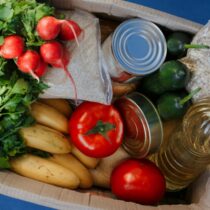
The Consolidated Service Hubs the County established when the pandemic first began in 2020 could lose an important source of funding in 2024.
The new fiscal year began July 1. The County budget set aside $6.9 million to keep the hubs open and operating. The hubs have become a vital resource for tens of thousands of low-income residents. They provide free food to those in need plus diapers and other baby supplies. The hubs also have case management workers who help connect residents to County resources and services.
County Council Budget
The County’s Department of Health and Human Services oversees the hubs. The County Council budgeted money to keep the hubs functioning through the end of the fiscal year. It also approved a second appropriation for $6 million to purchase food for the hubs and other food providers in the County. The County buys the food from places such as the Capital Area Food Bank and the Manna Food Center. The hubs typically use about a third of the food stash the County purchases.
However, the $6 million is set to run out at the end of 2023. That is because the money is not part of the main County budget. Instead, the money is coming from funds left over from the American Rescue Plan Act. President Biden signed ARPA into law in 2021 to help communities recover from the pandemic.
Food Assistance
Last fiscal year (July 1, 2022-June 30, 2023) the County spent $12 million to buy food for the hubs and other food providers in the County. Right now that figure could be cut in half unless the County Council approves an additional $6 million which would provide funding for food from January 1, 2024 until the fiscal year runs out on June 30, 2024.
Heather Bruskin is the director of the newly created Food Systems Resilience Office. She is hopeful the Council will approve the money.
“The goal is to reconvene with the Council in the fall and to put forth a proposal for the second half of the calendar year. This will hopefully establish more of a baseline approach for what the funding will look like in the future,” Bruskin said.
At this time, there is no firm commitment the Council will approve the money. MCM reached out to Council President Evan Glass.
He said in a statement, “As Council President, my goal is to uplift the needs of residents from every corner of our community. Throughout this challenging economic year and a challenging budget, we have worked hard to keep our promises and keep Montgomery County moving forward. We have made important progress in reaching those who are food insecure, and I will continue to advocate funding those programs.”
If the Council decides not to provide more money, Bruskin said she will “approach each situation as it comes.”
The Hubs Evolution
Within the first year of the pandemic, the County set up eight hubs, many of which were affiliated with faith-based organizations. Churches were closed, so the buildings were not in use. The County turned to these churches for help. Officials say this approach helped establish a level of trust in the community instead of setting up government centers.
The hubs have evolved over time. When Covid-19 hit, there was an urgent need to get food and other supplies to residents quickly. Volunteers and workers handed out what was called ‘Grab and Go’ food. People would either drive or walk up to the hubs and get a bag of food to take home. That approach has changed.
Community Choice Pantries
Patrick Campbell is the Deputy Chief Operating Officer for the Department of Health and Human Services. He said one of the changes at the hubs he is most proud of is converting the food distribution from ‘Grab and Go’ to Community Choice pantries. People can now shop at the pantries as if they were in a grocery store, and get the food they want instead of workers handing them bags of food.
“When the client comes in and chooses, you can adjust your ordering based on what the client wants or needs. We recognize the plethora of diversity that exists in every culture, so clients can choose what they prefer,” Campbell said.
He cited another benefit with the Community Choice model. Campbell said residents who stop by the pantries can now interact more with case management workers.
“People get out of their cars. That creates space for conversations and developing relationships. We’ve seen overwhelmingly that our case managers are able to effectively engage with residents,” Campbell said.
The hubs have grown in other ways. Campbell said each hub is unique. Some hubs offer more than just food and diapers. Some hubs distribute donated clothes and even medical supplies such as Covid-19 test kits. Others host different programs from sewing classes to information about health care.
Overall the hubs are helping about 7,000 families across the County which is at least 30,000 people.
Oak Chapel United Methodist Church Dropped As A Hub
While the hubs service a lot of people, the Department of Health and Human Services decided to reduce the number of hubs from eight to seven for this current fiscal year. Oak Chapel United Methodist Church in Silver Spring is no longer serving as a hub, much to the dismay of Dr. Sherri Wood-Powe, pastor at Oak Chapel.
The Oak Chapel hub opened in October, 2020 and began distributing food to about 200 people a week. That number quickly grew to 500 and when the hub ended its service at the end of June it was serving more than 600 people a week. The hub also distributed diapers and provided other services. Workers would put together health kits for residents who contracted Covid-19. Those kits included thermometers, tea, and Covid-19 test kits among other items. Besides these services, two case managers were on site twice a week to counsel residents.
Wood-Powe said Oak Chapel was serving people in the 20906 zip code which covers parts of Silver Spring that include Aspen Hill and Layhill. She said Covid-19 hit the area hard.
“Even before the pandemic we’ve had the most need in the entire County, and yet we have the least amount of services. So we’re sort of stumped as to why the County would decide to close us down,” Wood-Powe said.
Decision To Close
The Department of Health and Human Services said the decision to close Oak Chapel as a hub had to do with efficiency.
Several other hubs including Interfaith Works Hub in Twinbrook, and Mid-County Hub at Harvest Intercontinental Church in Olney are located within a 10 minute drive from Oak Chapel.
“That part of the County actually has the most hubs within a short area. The three of them were our smallest hubs. You lose a certain level of efficiency when you get really small because your staff ratio goes down,” Campbell said. “So our investment has stayed the same. The amount of food we’re still putting in this part of the county remains the same,” he added.
Ongoing Commitment To Residents
Wood-Powe said many of the people she serves do not have access to transportation or have health problems that prevent them from traveling to another hub. That is why Oak Chapel is still trying to help people in the community.
The County has provided Oak Chapel with $20,000 to buy food during the current fiscal year even though it is no longer serving as a hub. That is just a quarter of the amount of money the County gave Oak Chapel when it was a hub. Oak Chapel also will no longer have case managers come to its site. Instead, it will have ‘navigators’ offer guidance and advice to residents but their presence will only happen on a monthly basis. Wood-Powe said the steep funding cuts are having a great impact on services.
“During July, I had to let go of most of my staff. I now just have two staff members, and a team of volunteers who are working very hard to make this happen,” Wood-Powe said.
Oak Chapel is still serving about 350 people in the community. She receives food from nonprofits such as Nourish Now, and she is still getting some free diapers from the Greater DC Diaper Bank. Congregants from Oak Chapel have provided some money to keep the operation going. Wood-Powe also said she is trying to secure grant money. She said she is trying to raise about $100,000 to maintain services for the 350 people she is currently serving.
Searching For Help
Oak Chapel has set up a GoFundMe page, and it is accepting donations. People also can get more information on the church’s website, oakchapel.com.
The County wants residents to know if they have food needs, there are resources to help. People can reach out to the seven existing hubs for help or they can call the County’s 3-1-1 phone number and someone will connect a resident to the appropriate office.
Hub Locations
Below is a list of the Consolidated Service Hubs and their locations:
- East County Hub at Kingdom Fellowship Church, Silver Spring
- Gaithersburg Cares Hub at Seneca Creek Community Church, Gaithersburg
- Hub at Hughes United Methodist Church, Wheaton
- Interfaith Works Hub, Twinbrook
- Mid-County Hub at Harvest Intercontinental Church, Olney
- Silver Spring Hub at Clifton Park, Silver Spring
- The Upcounty Hub, Germantown


Comments are closed.